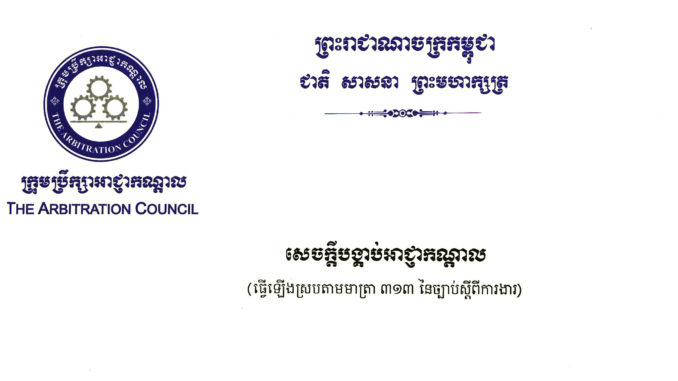
Through labour dispute resolution by the Arbitration Council, parties have the right to choose two different types of arbitral awards— a binding award or a non-binding award. If the parties agree to choose a binding award, the award is implemented immediately; if, however, the parties choose the latter, they may lodge objection to the award within eight calendar days, as specified by law. If no objection is lodged within that period, the arbitral award shall be immediately implemented. The party can lodge the objection at the Secretariat of the Arbitration Council.
However, although there is an objection parties still can implement the award. The Arbitration Council Foundation conducts a quarterly evaluation of the parties’ compliance of all arbitral awards issued by the Arbitration Council. This evaluation is conducted through a phone-call questionnaire performed more than 60 days after the Arbitration Council has issued an arbitral award. Based on an analysis of arbitral award compliance, we found that a number of parties who had lodged opposition against a non-binding award, later accepted and implemented that award. The following case illustrates such an event.
On 7 February 2018, the Arbitration Council issued an arbitral award in case No. 003/17, in which the workers demanded that the employer improve working conditions; six issues were involved. The employer’s main business is garment manufacturing in Khan Mean Chey, Phnom Penh where it employs approximately 90 workers.
Of the six issues, after facilitation by the Arbitration Council, the parties reached agreement on two issues and hearings were held by the Council on the remaining four issues. The Arbitration Council issued awards as follows:
- Ordered the employer to pay unpaid attendance bonuses arising from a pro rata wage deduction for a three day period during which workers had taken leave authorized by the employer.
- Ordered the employer to reimburse wages, attendance bonuses, and fines totaling $15 that the employer had deducted from each of two workers during their participation in an Arbitration Council hearing on 5 September 2016.
- Ordered the employer to provide wages and allowances at the rate of 50% for the period of 90 days to female workers using average wages during the prior 12 months as the basis for calculating said wages and allowances. These payments are to be made at least one day in advance of the start of the employee’s maternity leave.
- Ordered the employer to pay back wages and attendance bonuses to two workers for sick leave authorized by either state or private hospital.
In this case, the parties chose a non-binding arbitral award, and the employer objected to the award. Therefore, the other disputing party had the right to go through further proceedings including, but not limited to, a request to the court for final resolution or the right to strike.
In this case, the Arbitration Council Foundation’s survey learned that after the objection against the award time limit had passed, the employer had still not complied with the decision. Therefore, the workers continued its proceeding and went on strike, demanding that the employer adhere to the arbitral award. As a result of the detail and clear reasoning inscribed in the award, however, the employer eventually fully complied with the arbitral award. This clearly shows the Arbitration Council’s effective participation in resolving collective labour disputes, and its contribution to maintaining improved employment and workplace relations.



